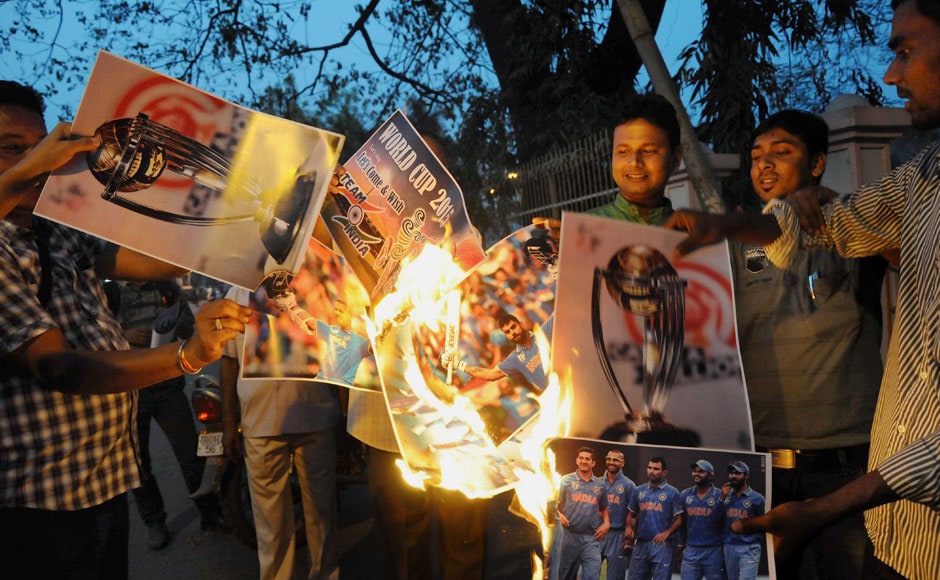In 2006, when India lost to South Africa in a series of one day matches, cricket fans in India went on a rampage. Mohammed Kaif’s house in Allahabad was attacked and the effigies of the players and Greg Chappell, the coach, were burnt in MS Dhoni’s hometown, Ranchi. Some members of Parliament wanted to move a privilege motion against Chappell for some remarks he made. A year later, when India lost to Bangladesh in its opening match in World Cup, Dhoni’s under-construction house was damaged. Protesters in Ranchi, who also burned his effigy, reportedly chanted “Dhoni die, die”. Last year, the target of attack was Yuvraj Singh’s house, when India lost to Sri Lanka in the T20 World Cup. [caption id=“attachment_2176047” align=“alignleft” width=“380”]  Angry Cricket supporters burn the posters of Indian team as the team lost to Australia in the World Cup semi final clash, in Agartala on Thursday. PTI[/caption] On Thursday, the spectacle of angry protesters decrying the team was back on the streets yet again. This time, the person who attracted most of the national outrage was Virat Kohli, or more precisely his girl-friend Anushka Sharma. Fearing yet another mob fury, paramilitary forces were deployed at captain Dhoni’s residence, even as shaming of Anushka for Virat’s failure and India’s downfall, continued unabated on social media. Elsewhere in the region, cricket-crazy Pakistanis went on a rampage smashing TV sets and conducting a mock trial of their national team after they went down to Australia in the quarter finals. This was preceded by even more vicious fan-fury on the streets when the team lost to West Indies a few days earlier. In Bangladesh, the countrymen were hard pressed to find a reason for their team’s defeat to India and finally sought fault with bad umpiring and a scheming India. There were no major scenes in Sri Lanka this time, but in the past, there have been clashes, protests and name-calling whenever the team lost. That cricket is synonymous with hyper nationalism and national pride in south Asia is stating the obvious, but what’s disconcerting is how fragile and shallow this pride is because the countries in the region have nothing else to be so furiously proud of other than this colonial vestige. It’s as if they are going to war when their national teams play cricket. Leave sports alone, isn’t it shameful that the countries of the most populous and poorest region have nothing else to be proud of? When nothing else is working in their favour, cricket is a proxy to establish their dominance against another country, particularly when it offers the possibility to defeat first world countries such as England and Australia. For Pakistan and India, it’s a proxy for war that they would not like to lose. As cricket journalist Sharda Ugra noted in “Cricket and National Identity in the Postcolonial Age”, only two things brought India together: war and cricket. “Only two institutions could therefore keep the flag flying: the army and the cricket team. War and cricket were to be seen as interchangeable”. She also recalls how the Mumbai strongman Bal Thackeray wanted to see “Muslims with tears in their eyes” whenever India lost to Pakistan. This flimsy national pride is bad for India because it robs the nation of its confidence and possibility of excellence in arts, literature, culture and science. Other than politically manipulated nationalistic events such as a Mars mission or a nuclear test, Indians have forgotten the diversity of their potential or achievements. Even in sports, they relive to death the glory of the 1983 World Cup victory although an unsung hockey team had brought home an Olympic gold three years earlier. Indira Gandhi, who said “we can do it” when Kapil Dev’s boys lifted the cup at Lord’s in 1983, didn’t have anything similar to say on the country’s hockey triumph. The sad part of this phenomenon is how it’s exploited and successfully merchandised. The cricket crazy Indians forget that it’s a private enterprise run by an exclusive club of industrial and political chieftains and power brokers with malleable rules that reek of incest, nepotism and corruption. Dhoni’s men are not a national team, but a team chosen by a private body that run a multi-billion dollar business exploiting the national pride of poor Indians. The BCCI, which schedule cricket matches round-the-year to make money for themselves, players and fellow-travellers, didn’t think twice before saying no to Asian Games, Commonwealth Games or Olympics. Running a commercial enterprise is more important for them than winning a gold for India. Visiting journalists, such as James Astill of the Economist (author of Great Tamasha: Cricket, Corruption and the Turbulent Rise of Modern India) had found this baffling - how a Colonial game has become a national obsession and money spinner. Therefore, the BCCI should be happy that Indians are angry with the Indian cricket team and are abusing them because that’s what will bring them their billions. Dhoni and Virat, despite their momentary vulnerability, should also be happy because that’s what will bring them fans and endorsements. With a lower baseline now, a win next time will look bigger than what it will really be. Anushka shouldn’t worry too much because the same Indians are anyway giving her a lot of money and fame.
On Thursday, the spectacle of angry protesters decrying the team was back on the streets yet again.
Advertisement
End of Article


)

)
)
)
)
)
)
)
)



